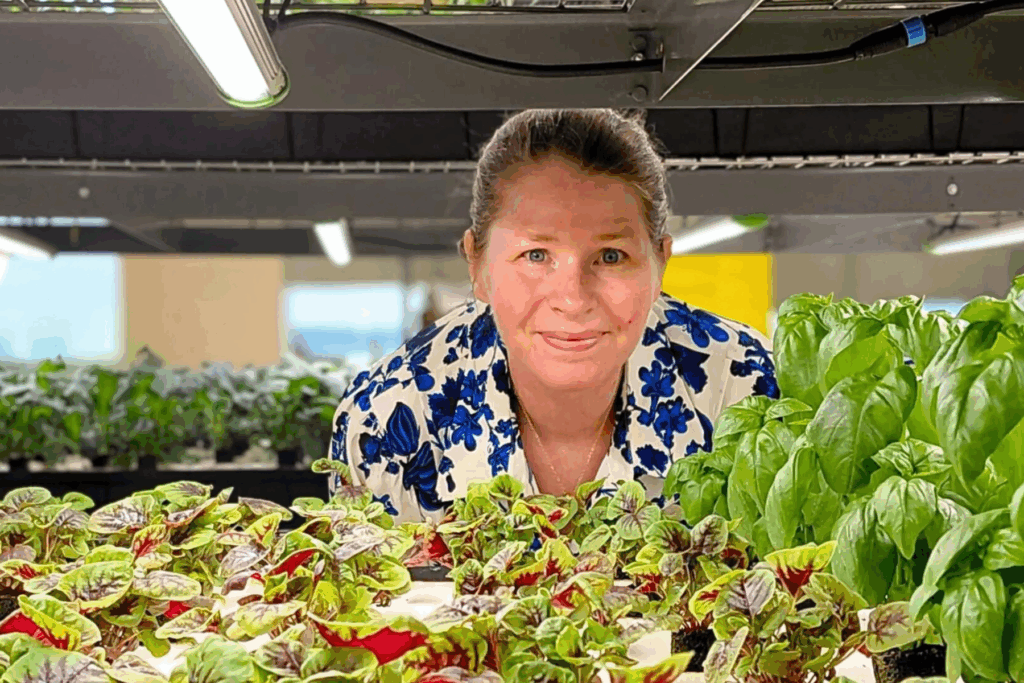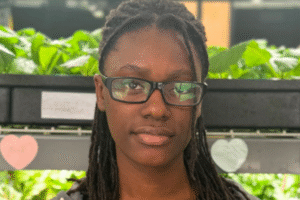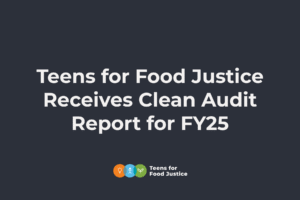By: Emily Miller & Pamela Honey
TFFJ Spotlight: Meghan Groome, PhD, TFFJ’s New CEO
A Mission That Hits Home
For Meghan Groome, stepping into the role of CEO at Teens for Food Justice is more than a career milestone—it’s part of a deeply personal lifelong journey. Growing up as someone who experienced food insecurity has guided a lifelong commitment to food justice, and, in what might be unexpected ways, even shaped her leadership philosophy. Her lived experience is part of what drives her to prioritize dignity, inclusion, and belonging in her decision-making– because she understands the importance of young people and families having agency, access, and a voice in shaping their own food systems.
And even though she’s spent all of her career as an educator and has a doctorate in science education, this mindset isn’t just an academic exercise—it shows up in her personal life on a regular basis. Meg and her son volunteer each week at a local food pantry, where their experience together often sparks hard questions. “He always asks me why food insecurity even exists in a place like this [New York City],” she shares. “Being part of the answer to that question became important to me as a parent and as an educator.”
“He always asks me why food insecurity even exists in a place like this [New York City]. Being part of the answer to that question became important to me as a parent and as an educator.”
That drive to help young people find answers has always been a motivating factor. Add that to her background leading STEM programs around NYC and the world, combined with her love of gardening, and TFFJ’s mission felt like a natural fit. What excites her most is how kids move from questions to solutions. “Kids don’t just study hydroponics—they grow food, cook with it, and share it with their families. That’s the kind of education that changes lives.”
In her initial conversations with TFFJ staff, board members, and students, she discovered another layer that made it even more compelling – an organization where people could chart their own paths. “Some were really attracted to the food side, others to the policy side,” she explains. “I saw an organization where people could find their place—and that was exciting for me too.”
Following Students’ Lead
From her first days, Meghan has been clear that her approach should be guided by students’ ideas. Soon after coming on board, she read a recap of the 2025 Student Leadership Conference and was struck by recurring themes in the projects students presented.
“They were already pointing us toward the future,” she says. “More work-based learning, more on the business side of urban agriculture, even new ideas like beauty products from the plants we grow. There’s this expanded universe of urban agriculture that the kids are already leading us toward. Programmatically, my role is to follow their lead.” She acknowledges, “All of these ideas need to be tested by reality. The most important question is: do these ideas fit with our teachers, staff, and community partners? And can we raise the resources to make them real?”
She also recognizes that in-school farms aren’t just learning labs, but commercial-scale models that can prepare students for real-world careers. “Our farms mirror commercial farms in many ways. That means we can map out real career-connected opportunities,” she says.
Meghan is also quick to point out that listening to students doesn’t just mean amplifying the most enthusiastic voices. “It’s not just about the kids who raise their hands and volunteer for everything,” she says. She recalls hearing from a student who was placed in a farm-based class by chance and discovered unexpected value in the experience.
Leading as an Educator, Parent, Human
As she crafts her role at TFFJ, Meghan expects to draw on multiple identities: executive, educator, parent, and food lover, each one strengthening the others.
“As an executive, I know how to handle finance and operations, and I feel grateful to inherit such a strong foundation here. But I also bring the perspective of an educator, constantly asking: how can we build programs that say, ‘come in, welcome, you belong here’?”
She’s also able to understand the impact that farms can have in the life of a school, often serving as anchors for schools themselves—something she’s seen firsthand as both a parent and a PTA leader. “They nourish the school, they distinguish one school from another in a city of school choice, and they link classroom to kitchen.”
And at the most basic level, she leads as someone who flat-out loves food. “I want our kids to have full bellies so their minds can imagine the world they want to be part of,” she says. “I come as a hungry human, but also as a human who wants to make the world a better place through food justice.”
“I come as a hungry human, but also as a human who wants to make the world a better place through food justice.”
A Culture of Belonging
But for kids to imagine and build the world they want to be part of, they need to feel welcome in the spaces they’re in today. Meghan often returns to the idea of “psychological safety”—the belief that people should feel welcome when they first encounter a program, and with time, feel that they belong there.
“Belonging isn’t accidental,” she says. “It’s something you design for.” She points to the TFFJ farm at the Martin Luther King, Junior Educational Campus, where there’s plenty of welcoming and inviting signage. “It takes something that could look intimidating from the outside and turns it into a space where everyone feels welcome. Designing for all students means making the farms warm, welcoming spaces—even for the tough cookies who didn’t think they’d like it but did,” she says. “Those students help us design for everyone.”
“It takes something that could look intimidating from the outside and turns it into a space where everyone feels welcome. Designing for all students means making the farms warm, welcoming spaces—even for the tough cookies who didn’t think they’d like it but did.”
She experienced that same sense of welcome herself, recounting a staff and board social event: “We did karaoke, which made me nervous. But I had the best time. People made me feel instantly comfortable, able to be my authentic, silly self. That spoke volumes about the culture here.”
Life Beyond Work
Meg’s authenticity extends to being open about her journey through burnout and postpartum depression– challenges which pushed her to reclaim space for creativity and joy outside of work and parenting.
“I literally had to learn to breathe again,” she says of taking singing lessons. Today, she sings in the Brooklyn Women’s Chorus, a social justice-focused ensemble, and paints watercolors with her daughter in addition to the weekly pantry visits with her son.
“I think it’s so important for my kids to see that making something beautiful often starts with making something imperfect,” she says. “Whether it’s squeaking your way up to a high note or spilling watercolor on the page—it’s all part of creating.”
Looking Ahead
Meghan is excited to help the organization move into its next phase, building on a solid 13-year track record. She knows there are countless possibilities ahead but is clear about her immediate focus: creating calm, welcoming spaces where every student can thrive. “In a time of great discord, there’s no greater vision than that,” she adds.
“What I want our farms to be is a place where kids, teachers, and schools find safety and belonging,” she says. “A place where you can walk down the hall, see the farm, and know that it’s for you.”
And she emphasizes her gratitude for the staff: “Kathy told me that the staff here was incredible, and I 100% believed her. But I’ve been blown away by the talent and warmth of this team. Over the next months, I hope to prioritize time together—with our staff, our students, and our school partners. That’s been just so great.”
For Meghan, this is the heart of her leadership: building trust, centering people, and making sure TFFJ remains a place where everyone feels they belong. It’s the same philosophy that has guided her as a teacher, parent, and advocate—and it’s the vision she now brings into this new chapter for the organization.❦
Emily Miller is the Director of Development & Communications, and Pamela Honey is the Communications & Content Coordinator at Teens For Food Justice.





